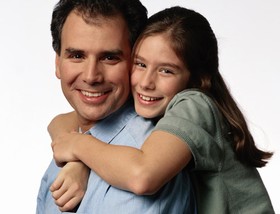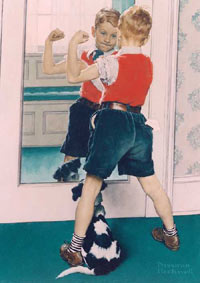Two become one?
They are obviously referring to their beloved when they say these words. I've often wondered what each of them meant, but I assumed those words meant something different to every one of them.
Then I come across this piece recently which contains the following:
There are plenty of love songs with the phrase, “You complete me.” Yet the accompanying notion that “two become one” implies that you are only 50% or half a person until married. That misguided belief has caused many disappointed brides who find out, only after walking down the isle, that marriage doesn’t fill you up, it doesn't complete you nor make you whole—a man offers so much in the way of love, understanding, companionship, strength but he cannot fill every void.
One some level, two indeed become one after a man and a woman make a promise to love and serve one another. But this doesn't mean that each is half a person before they pronounce their matrimonial vows. As the writer pointed out, "Marriage is the sum of the parts you already have; it either doubles the love or doubles the trouble, or doubles a little bit of both."
posted by sunnyday at 8:50 AM
2 comments
Remember the time

Excerpts from the article "Helping Elderly People," published in the Asahi Shimbun on May 24, 2005:
In the town of Shikatsu, Aichi Prefecture, an effective method has been adopted to prevent senile dementia. It is called a “memory-method approach,” and involves elderly people discussing their memories among themselves.Full story at Global Action on Aging
One of the participants said, “We went to school with a handmade cloth bag on our backs.” Another said, “We called a pencil box ‘fudezutsu.’”
They talked without interruption, switching from one subject to another, from umbrellas to school records and lunches. Their memories were surprisingly vivid, and the coordinators paid attention so that every participant talked.
The memory-method approach stabilizes the elderly people's state of the mind. They remember things relatively well even if they suffer from cognitive disease. They scrape together their memories and, in their minds, return to the course they have taken. By practicing that procedure, they reinvigorate their brain and gain the courage to meet the current circumstances they face.
The memory school was opened four years ago. The town's museum of folklore, in which about 100,000 pieces of houseware and toys, such as washtubs, folding dining tables and traditional cooking stoves commonly used in the Showa Era (1926-1989), are crammed, played a large part in establishing the school. The fact that elderly people who visited the museum became lively at seeing the articles being shown offered important suggestions to the planners.
posted by sunnyday at 10:02 AM
0 comments
Bloggers for life get together
 Know what EB stands for?
Know what EB stands for?"Eyeball."
And it's got nothing to do with a visit to the ophthalmologist.
I first heard the term around 1998, used to refer to a meet-up between people who correspond through email, online forums and chatrooms. I tend to think the fellow who coined the term with this definition is on Philippine shores since I got a "huh?" everytime I mention the word to my online buddies then living elsewhere.
What's happening on the 23rd of this month is somewhat an eyeball, but then it goes deeper than sharing a cup of coffee and hanging out (which is what takes place many times among those who engage in this kind of meet-up).
Needless to say, Blogs4Life -- the first annual conference of pro-life bloggers -- will be a gathering with a goal. It'll be fun, too, and non-bloggers are welcome to join them, but suffice it to say the participants will be there not merely to hang out. I wish I could join them and meet others who regard respect and care for human life as a priority, especially in today's world where human dignity seems to be forgotten or disregarded by many.
The conference, organized by Tim of ProLifeBlogs and sponsored by The Family Research Council, will be held in Washington D.C. right before the March for Life gets going.
posted by sunnyday at 11:14 AM
0 comments
Walk the talk
Words are mere bubbles of water, but deeds are drops of gold.
- Chinese proverb
posted by sunnyday at 10:47 AM
0 comments
Daddy, play with me?
An excerpt from the book Hidden Messages: What Our Words and Actions are Really Telling Our Children
He peeks into his wife’s home office and greets her warmly. As they chat about their day, she asks if he’d mind fixing dinner so she can finish up a few things. “No problem,” he assures her. Before heading to the kitchen, he pauses to savor a moment’s peace, silently planning out the next few hours: check the mail, listen to messages, take a nice hot shower, change into sweats, fix a quick dinner…
“Hi, Daddy! Play with me?” Snapped out of his reverie, Jeff puts on a smile and bends to wrap a hug around the giggling little angel with the hopeful eyes. He twirls her around in big circles and plants kisses on her nose. “Hey, my little Lily-flower!” he croons. He buries his nose in her soft hair, loving the little-child feel and scent of her. Laughing with glee, Lily cherishes these sparkling moments in her daddy’s arms; craving more, she implores, “Play with me?”
“Hey, punkin’, I have some things to do; then we’ll play later.”
“Just a little while, Daddy?” she pleads with a smile. But looking at his face, she suddenly knows he’d never drop everything just for some silly play, but she can’t help asking one last time. When the expected answer comes, she wanders off resignedly to watch the TV show that’s always on at this time, always on for her when Daddy’s not.
Lily watches her program, all the while counting the minutes on the clock. Jeff loses himself in the mail, the newspaper, and the answering machine, looking forward to the completion of all his daily responsibilities so that he can play with his daughter. After some time on the computer reading e-mail, he trudges upstairs, loosening his tie. He can almost feel the steamy warmth of the shower, the comfort of those old sweats, the … wait, what is this?
He turns to find a beaming little girl, who’d sneaked up the stairs behind him, given away by the soft thumping of her tiny feet. She musters all the vocal sweetness that she imagines a good girl to have and asks, “Can we play now, Daddy?” She doesn’t want to bother him, doesn’t want to pester. She just wants him close to her, laughing his silly laugh just for her.
What Jeff hears is persistence -- a trait he will someday appreciate in her as an adult, but one that annoys him today. So, with a ruffle of her hair, he dismisses her with strained patience. “In a little bit, Lily. Why don’t you go ask Mommy if she can play with you now?”
* * *
“Ready for some dinner?” he asks, walking quickly past her in an effort to stave off a few repeats of her “Want to play?” chorus. He enters the kitchen and begins pulling items from the refrigerator. Just then, the telephone rings, and little ears listen -- as they always do -- as Jeff answers. “Hello? Hey, Steven. How are ya? Great. Did you catch the game Sunday? I can’t believe he missed that play…” And so he is lost to her again, this time to adult conversation, phone tucked between ear and shoulder.
After letting his wife know where he’s bound, he leans down to plant kisses on his daughter’s soft cheeks. “Be right back, punkin’,” he says. And he leaves too quickly to notice the silent tears that begin to run down those same cheeks so hastily kissed, soft cheeks that are soon buried in pillows. When Jeff returns, she is asleep, dreaming of moving out and becoming a neighbor who could ring the doorbell, call Daddy on the phone, and send e-mails to him.
Read more at Dads Today
posted by sunnyday at 10:30 AM
0 comments
Marching for life

The 33rd annual March for Life, which happens in Washington D.C., is coming up -- it's on Jan. 23, and a look at some sites containing information about the event shows that preparations have been underway for quite a long time now.
The march and rally, which mark the anniversary of the U.S. Supreme court's 1973 decision to legalize abortion, last year drew about 100,000 people from different parts of the country . Apart from the main event, other activities are happening on that day as well as on days prior to it.
Silent No More Awareness Campaign has these gatherings to be held in different states, in preparation for the Jan. 23 event. American Collegians for Life (ACL) is holding its 2006 ACL Conference on Jan. 21 at the Catholic University of America (also in Washington D.C.). Rock for Life's 2006 Training Weekend is on Jan. 20-23 (details are on this page). And Fr. Frank Pavone, the national director of Priests for Life, has a full schedule of March for Life activities, starting on Jan. 12th.
Then, there's Blogs4Life, the first annual conference of pro-life bloggers, happening on Jan. 23, also in Washington D.C. The conference keynote speaker will be syndicated columnist and National Review Online blogger Kathryn Jean Lopez.
Looks like the D.C. area will be mighty busy in a few weeks' time!
February, on the other hand, is Pro-Life Month in the Philippines. More about that soon.
** Photo from A Child is Born by Lennart Nilsson
4 months old, 16 cm (about 6 1/2 inches) long. When the feet and toes are partially developed, it is the leg's turn to grow. The spiral shape of the umbilical cord is caused by the fact that the two arteries and the vein are longer than the sheath in which they are contained -- an ingenious safety device for lively fetuses!
posted by sunnyday at 3:15 PM
2 comments
Wandering
Since then I had tried to locate some of the sites I could remember (good thing the archives contain references to them!). Did you know that digging up old posts can be so much fun? It's like going through a box of memorabilia or reading old letters and notes from high school friends. Of course, this blog's archives only go back as far as May 2005; still, it was somewhat awe-inspiring to see the wealth of materials posted here (I especially liked reading about Joshua Heldreth once more).
The next couple of posts may seem familiar to you, and that's because they are "repeats."
The text immediately following this, however, is something I discovered just a while ago at Ask Dutchy, as I was reconstructing the "Blogs I Peek Into" list. It sure is an eye-opener.
Wandering Alzheimer's
Here is a post from www.mycarelink.net a forum for families who are caring for a loved one with Alzheimer's.
The lost are found, with a little help from Safe Return Program
Keeping them safe
By Lisa Ryckman, Rocky Mountain News
November 14, 2005
On a fall day seven years ago, Kenneth Talburt went for a walk and never came back.
Nobody knows where the 75-year-old man thought he was going when he put on the baseball cap that proclaimed him "No. 1 Granddad" and left his home at the Grandview Acres trailer park in Cañon City.
For years, nobody knew where Kenneth Talburt was.
And he was only a mile away.
Some hikers found his remains, and the hat given to him by his granddaughters, down a steep embankment in a wooded area in May. It appeared that he had walked until he couldn't anymore.
Like the estimated 30,000 other people who wander away every year, Talburt's last walk was propelled by Alzheimer's or some other dementia-related disease, police believe. It's estimated that 60 percent of the 4.5 million Americans with dementia will wander, becoming lost and confused - even in a place they've lived for years.
There's a one-day window to find them before their chances of survival are cut in half, research shows.
"It's very dangerous behavior," says Catherine Sewell, director of client services for the Alzheimer's Association. "And the longer they're missing, the worse it is."
While the word wandering implies aimlessness, its definition changes when dementia is involved, says Jennifer Pancer, safety specialist with the Alzheimer's Association. Most people who become lost had a goal in mind.
"These folks get stuck in a past time, and they head out to fulfill whatever was happening at that time in their lives," she says.
Deborah Uetz's father was used to driving and taking long walks when he was diagnosed with Alzheimer's, even though he was getting lost in the home he'd lived in for 50 years.
"The fear of him becoming lost was my greatest nightmare," says Uetz, co-author of Into the Mist: When Someone You Love Has Alzheimer's. "My husband's grandmother had suffered from Alzheimer's disease and was killed by a truck while wandering on a dark road in the middle of the night."
But putting limitations on loved ones, even for their own good, can cause guilt feelings for caregivers, she says.
"Asking my dad for his car keys was one of the hardest things I ever had to do," Uetz says. "Unfortunately, there are a staggering number of people who are driving with dementia because it is so upsetting to take their keys."
To keep her father safe during his walks, Uetz went along.
"The unexpected outcome of that was some conversations that meant the world to me," she says. "He talked about things he did when he was a little boy and even told me about the first girl he ever kissed. I actually got to know him better after his illness than I had before his symptoms began."
Wandering can happen at any time, Pancer says, and any memory can trigger it. A woman who was put on a bus in Missouri bound for Georgia ended up in New Jersey - the site of her daughter's funeral four years earlier. She was living on the street when she was found nine days later.
"Her daughter's funeral may have been the last time she was on Greyhound," Pancer says.
Wanderers on wheels, such as a man who drove across three states because he thought he needed to get to work, are rare, Pancer says. Most go on foot, like Anna Sporcich, who clearly had a destination when she walked away from her Denver assisted-living residence in May, an extra pair of shoes in her hand.
She headed to the home she'd lived in for 27 years but fell down with nine blocks to go. Police took her to the emergency room and tracked down her daughter, Mary Hanna.
"I sat in a chair crying like a baby. I was scared to death," says Hanna, who was vacationing in New York when police reached her. "I was so far away. And it's my mother."
Hanna had registered her mother with the Alzheimer's Association Safe Return Program, a nationwide, round-the-clock identification system. In its 12 years, 100,000 people have been registered with Safe Return, and it has helped locate more than 7,500 of them.
The entire article can be found here
posted by sunnyday at 10:48 AM
0 comments

"Resolve to be tender with the young, compassionate with the aged, sympathetic with the striving and tolerant with the weak and wrong. Sometime in your life you will have been all of these."
- Dr. Robert H. Goddard
posted by sunnyday at 10:21 AM
0 comments
A husband's letter
If I End Up Like Terri: An Open Letter to My Wife
By Mark HartwigDear Janelle,
These last few months have troubled me deeply. And I have a request that I hope you'll have the courage and strength to honor: If I ever become like Terri Schiavo, please don't put me through what she has endured.
After fighting cancer for 10 years; after suffering through multiple courses of toxic drugs; after two stem-cell transplants and 16 dismal weeks in a hospital room, tied to tangles of tubes, I've only scratched the surface of her misery. I feel as if I've scaled great mountains of suffering only to find I'm in the foothills of a range that towers beyond sight.
Dear, if I'm ever forced to scale that range, if I ever become like Terri — whether through the myriad drugs I'm taking, future treatments or the cancer itself — please don't pull my feeding tube. Instead, if at all possible, take me and my tube home, where I can live out my days with you and the kids, and where friends can come and go as they wish.
Put me in a place where I won't be in the way, but can still sense the activity of life around me. Talk to me; share your hopes, fears and failures with me. Read me books. I may not understand, but perhaps I'll sense the warmth of a lover's voice. And I promise I won't interrupt, or give away your secrets. And deep down inside, perhaps I'll groan a wordless prayer for you.
And please, please, please don't crush what's left of me by taking another lover while I still live. You're my wife, Dear, my only lover. Apart from God alone, you're the one person who daily breathes confidence and acceptance into my life. You're the one with whom I can feel unashamed and completely at home. I can absorb the loss of many things. But please don't rob me of that. Abide with me, as you have done so faithfully through our many years of trauma and tears.
This is my wish, Dear. I hope to live with you a good many years. I hope to grow old with you and see our grandchildren. But if I don't, know that I love you and that I always will. I promise ... just as I did a quarter century ago.
With all my love,
Mark
posted by sunnyday at 10:15 AM
1 comments
Kids and the things they say
My four-year-old cousin scared us one summer when he disappeared during our beach holiday. More than a dozen relatives banded together and searched the whole place. To our relief we eventually found Martin playing calmly near the cottages. "Listen to me, Martin," his mother said sharply. "From now on when you want to go some place, you tell Mommy first, okay?" Martin thought about that for a moment then said, "Disneyland."
From Reader's Digest
posted by sunnyday at 9:06 AM
0 comments
The most important man in a girl's life

"My father is my role model. I compare all the other men in the world to him. My dad is the most loving, tolerant, admirable, dependable man I've ever known. He is the model that I judge all other men by. Sharing this kind of relationship with my dad has given me a lot of faith, encouragement and direction. That love and support I have had through the years, and continue to have, has made me a much stronger person," a daughter told me once.
Dear father, nurture your daughter
By Rachna R. Buxani, Gulf News Report
posted by sunnyday at 5:28 PM
3 comments
Men as protectors

Did you ever see an episode of "Little House on the Prairie"? I did, as well as dozens and dozens more (it was part of my weekly viewing fare as a kid). Now that I think about it, the clearest image of a father in my mind -- as far as the celluloid world is concerned -- has got to be Mr. Ingalls. And I remembered him after reading an interview of educator and author of parenting books, James Stenson, about the role of fathers as family protectors. Here's an excerpt:
Q: Why is it important for fathers to maintain the traditional role as protectors of their families?
Stenson: It's important that we see the role of a father's protection in a broad sense, not just as physical protection from harm.
When we look at the very important ways a man protects his family, we can better understand the dire effects in today's families caused by the man's absence -- either physical or moral -- in family life.
So, what are the different forms of this manly protection?
First of all, a family man devotes his manly powers to protect his wife from anyone who would threaten her. It seems to be a natural instinct among males, to protect the women in their lives -- wife, mother, sisters, daughters -- from outsiders' aggression.
For instance, if a man were standing next to his wife in a crowd and some male stranger turned to speak loudly and angrily toward her, the husband would instantly rise in rage to her defense. Adrenaline would rush through his blood, his muscles would tighten and his first impulse would be to rearrange the aggressor's face.
No self-respecting man would stand by and let anyone treat his wife with disrespect. He would take swift action to defend her.
Related to this physical protection is another aspect of a man's protectiveness, one that fathers today often fail to understand. A man permits no one to threaten or upset his wife -- and this includes their own children.
A hugely important part of a father's job is to defend his wife against their children's rudeness, insolent disobedience and impulsive aggression. This protection counts most to his wife when the children are small -- under 7 years of age -- and later when they enter adolescence. A man will permit no one to disrespect his wife, including -- and even especially -- at home.
A man also defends his family through what he earns in his work. That is, he doesn't just provide for his family; he protects them from poverty. He shelters them, takes care of their needs for a roof, food and clothing. While Dad has a job, the family feels secure. Even in a two-income home, it seems, children sense that Dad is the main provider, and therefore the family's main protector.
Moreover, he protects his children from forces that threaten them here and now: drugs, bullies, criminals, unjust aggressors of all types and potential disasters arising from their inexperience and impulsive mistakes -- such as dashing out into traffic or playing with matches.
Peace, it is said, is the condition we enjoy when other people just leave us alone. Throughout history, the father of a family would protectively stand in the doorway of his home and say, as it were, to the whole world: "Leave us alone. Leave my family alone."
For instance, if a father glanced out his living room window and spotted a male stranger chatting with his small daughter, coyly beckoning to her, he would swiftly lunge into defensive action. He'd race out the door, stride aggressively toward the stranger, then confront the man and demand to know what he wanted. With muscles taut, he would stand between his daughter and this potential aggressor, physically shielding her from harm.
Another example: When his teen-age daughter is being picked up for a date, a father goes out of his way to size up the young man she's going out with. He wants to meet him -- insists on meeting him -- to look him in the eye and intuitively size up his intentions and his worth. A father senses a duty to assess any young male who approaches his daughter. An unspoken message seems to pass between them: "She's my daughter. Treat her nicely, kid, or else ..."
But most of all -- and this is crucially important -- a father protects his children by strengthening their judgment and will so they can later protect themselves. In the lives of his children, he asserts loving leadership toward responsible, competent adulthood.
It is a father's mission -- the challenge that brings out the best in him -- to form in his children the powers and attitudes they will need to succeed in life, to strengthen them so they in turn can later protect themselves and their own loved ones.
So, in his children's eyes a great father is a lifelong leader and teacher. His protective, empowering lessons about right and wrong live on in the inner lives of his children, long after they've left home for good, and indeed long after he has passed to his eternal reward. A great father never stops being a father, for he lives on as a great man in the hearts of his children.
More at Zenit News Agency
** Illustration: The Muscleman (1939), by Norman Rockwell
posted by sunnyday at 4:40 PM
0 comments
Warm hands, warm hearts

Andrea's little daughters donning their lola's (grandmother's) homemade Christmas present!
From A peek inside the fishbowl
posted by sunnyday at 4:37 PM
2 comments
Time and tide

When I met them, Jake and Myrtle were both in their 80s and closing in on 60 years of marriage. 60 years! I hardly knew anyone who'd been alive for six decades, much less married for that long. I kept staring at them, studying them like they were a museum exhibit. Look. They keep smiling. Wait, now they're holding hands.... She just brought him some tea.... He's helping her down the steps. I'm sure I made them nervous with my psychopathic ogling.
The two met and married in the late 1920s. As the story goes, Jake was hanging out downtown with his best friend when Myrtle passed by on the other side of the street. "I sure would like to meet that girl," Jake wished out loud to his friend. "I think I can arrange that," said his friend. "She's my sister."
* * * * *
"It's a great adventure!" their lives said to me. "Strap on that life vest, hang on and paddle hard! Go for it!" That's what I needed. They provided for me a vision of marriage, a good marriage that handled whatever life threw at them, and thrived — all the way through to the end.
By then my wife [Alfie] and I were a few years into our marriage, doing our best to manage the unpredictable currents of young couple-hood, banging off rocks and getting stuck in low water and shooting thrilling rapids. Whenever our paddling was out of sync and the water would splash over the nose of the boat and douse our faces, I'd look up ahead, beyond the roaring whitewater, and see Jake and Myrtle, holding hands and cheering us on, assuring me that a little water in the boat is OK. Just bail it out, make adjustments and keep going. Twelve years later, with each new bend in the river, Alfie and I keep learning to better navigate the waters and row in unison (which says more about her than me, because if I were paddling with me I'd want to turn around and whack me in the head with an oar). Paddling after Jake and Myrtle
By John Thomas
posted by sunnyday at 4:30 PM
0 comments




